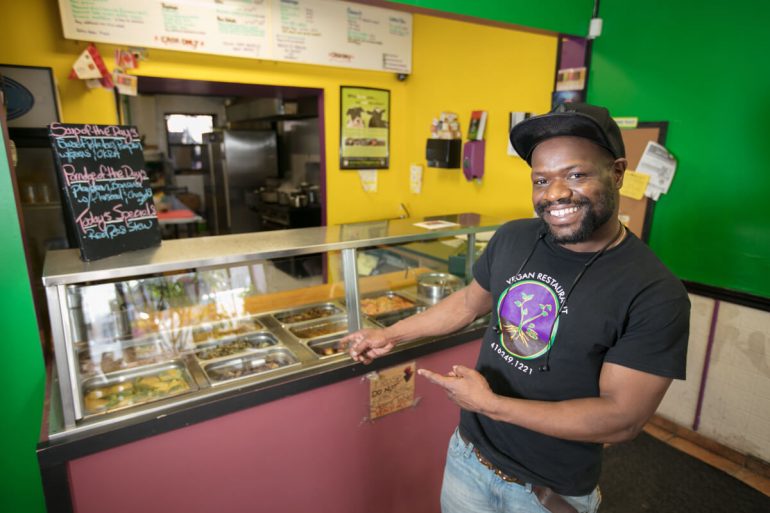In any business, there comes a time when its founder must change their thinking in order to get to the next level. Sometimes that’s due to market forces, other times to the natural pains of scaling. For businesses in Toronto’s rapidly-changing Eglinton Corridor, thinking differently has become a way of life.
With major commercial areas from Allen Road to Don Mills Road, the Eglinton Corridor stretches across the metro Toronto area, from Erin Mills Parkway in Mississauga to Kingston Road in Scarborough. Originally land belonging to three Indigenous tribes, which was then settled by European farmers in the early nineteenth century as a farming village called ‘Eglinton,’ the Corridor has a long history. Today, on top of many growing small businesses, multiple Canadian corporations are headquartered along the Eglinton Corridor, including Canadian Tire, TVOntario, and the Ontario chapter of the Canadian Heart and Stroke Foundation.
In an online-first world, bricks and mortar businesses face increasing challenges to get customers in the door.
Driving along the Corridor, you’d notice multiple distinct areas with their own vibes and types of businesses. While the Yonge Street and Eglinton Avenue intersection might be the most well-known, other communities along the Corridor thrive. From Mississauga’s Erin Mills Town Centre featuring global brands to Toronto’s West End “Little Jamaica” with boutique shops and restaurants, the Corridor has a lot to offer.
As the Eglinton Corridor undergoes construction of the Eglinton Crosstown subway line, local businesses have to change their methods in order to eventually tap into the long-term potential afforded through a better connected Toronto. To address these challenges, multiple Business Improvement Associations (BIAs) work with Digital Main Street to offer courses, resources, and consulting to small businesses. In partnership with Digital Main Street, BetaKit is profiling these Toronto communities and local entrepreneurs that are now leveraging tech to grow.
It’s a family business along Eglinton Corridor
Many businesses start off as family affairs, and both Stimoda clothing boutique and V’s Caribbean restaurant on the Eglinton Corridor are family-run businesses.
“The business was founded by me and my mom together,” said Maria Botonis, co-founder of Stimoda, found just west of Avenue Road and Eglinton Avenue.
“We have both always been interested in fashion, and travel a lot throughout Greece and the rest of Europe,” Botonis continued (Stimoda is Greek for ‘in fashion’). “We’d come home from our trips and everyone would compliment our shoes or dresses, asking where we got them. That’s when we realized we had an opportunity, so we started sourcing brands from Europe and Australia they didn’t have [in Toronto] for Stimoda.”

While Botonis noticed the opportunity through travelling with her mother, Dru Campbell of V’s Caribbean heard opportunity knock on his door to offer plant-based Caribbean food to the west end of the Corridor through a retirement in the family.
“My cousin was working in the food industry for a few years, so he had the restaurant experience,” he said. “When my mom retired and his mom had some money left over, they put their money together and put us to work. It was my cousin’s dream to have his own restaurant.”
“We try to offer our community [something a little different],” he continued. “[When we opened V’s], it was just pizza and wings up and down the [Eglinton West] strip. We try to give people a healthier option.”
Eglinton growing pains
In an online-first world, bricks and mortar businesses face increasing challenges to get customers in the door. But even when a business starts online, like Stimoda did using e-commerce for its fashion line, digital advertising and growth is a new challenge for many entrepreneurs.
“Everyone likes the principle of using tech to help grow your business,” said Sheliza Esmail of The Eglinton Way BIA. “For many small business owners that are responsible for every facet of their operation, adapting to the online world can necessitate a steep learning curve. Digital Main Street has to take the time to not only help small business develop their digital presence but also convey the importance of the digital world.”
Campbell was familiar with social media and active on a couple platforms, but wasn’t leveraging analytics to drive his business forward. Botonis said that Stimoda’s e-commerce offering was a matter of “just put[ting] together what they could” technologically, with little strategy behind it.
An increased focus on online presence doesn’t automatically solve the problem.
Pam Reynolds, owner of Reynolds & Associates Debt Management at Dufferin Street and Eglinton Avenue, is another perfect example of an Eglinton entrepreneur who learned the importance of digital business tactics. Reynolds started her business because she needed to become her own advocate; she was in debt in the 1980s and “took a course and started [her] own business” to get herself out of debt.
After getting herself out of debt, Reynolds realized that she could help others, too. Since 1991, Reynolds & Associates has helped people lift themselves out of debt and avoid declaring bankruptcy.
Reynolds initially used very traditional methods to advertise her business along the Corridor, including distributing flyers or advertising in local newspapers. These tactics helped her grow a small local following and client base, but Reynolds noted it was an expensive client-acquisition channel that had limited effectiveness.
Compounding the lack of tech familiarity was the fact that construction along the Eglinton Corridor has made traditional advertising less effective, a problem faced by Campbell and Botonis. An increased focus on online presence doesn’t automatically solve the problem, with many would-be shoppers preferring an online experience that supports and is supported by the in-store experience. Even for sit-down experiences like restaurants, many customers want to learn online before making the trek to the location.
Think different
In order to grow, entrepreneurs along the Eglinton Corridor have had to think differently, and many credit Digital Main Street in providing the resources needed to help.
For Reynolds & Associates, Digital Main Street helped her set up a web and social media presence to drive client acquisition and community building efforts.
“[Our social media and web presence] definitely saves us costs [in marketing and getting new clients],” said Reynolds, who added that she’s not only achieved more local clients, but also has been able to reach out to more people in a broader geographic area. Reynolds commented that many people simply didn’t know she was there before, but having a web presence helped with both online client-acquisition and supporting her in-person acquisition channels, like workshops.
For Stimoda, which started in e-commerce and opened up a bricks and mortar shop after a year in business, a swing back to digital helped the company streamline its operations.
“After Digital Main Street [helped us], we created a new website from scratch,” Botonis said. “They helped with connecting social media to the website, [which helped us become recognized], and we were able to set up a shopping cart through Shopify. I was using a different [online shopping cart] that was more complex. Shopify was really seamless.”
Each Corridor entrepreneur has now shifted their thinking to include digital tools as a way to grow their business. Moving forward, they’re also looking at how analytics from their various platforms – whether social media, e-commerce, or simply a well-designed web page – can help them make more informed decisions about how to grow their business, both online and offline.
“Before [Digital Main Street], I never really had the time to consider how big we were out there on social media; I was just putting stuff out every day,” said Campbell.
Photos courtesy Odyssey Photography


